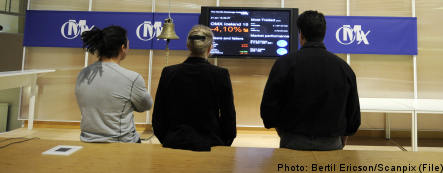By 4pm, Stockholm’s OMXS-index was down 5 percent on the day, with Swedbank shares down more than 15 percent to 85.25 kronor ($12.56).
The bank’s stock, which was Sweden’s third most-widely held as of July with 316,000 shareholders, has shed more than half its market value since the start of the year.
Carnegie’s stock price had also plummeted, down around 18 percent. Shares in SEB were down 11 percent, while the stock price for Nordea and Handelsbanken were down 4 percent and 6 percent, respectively.
Meanwhile, the Riksbank announced it was tripling the size of its previous reciprocal currency arrangement with the Federal Reserve Bank in the United States from $10 billion to $30 billion kronor.
“It is the responsibility of the central banks to cooperate and together safeguard financial stability,” the Riksbank said in a statement announcing the expanded swap facility.
The move will allow the Riksbank to lend more dollars to struggling Swedish banks in the hopes of avoiding further stress on already tight credit markets.
Despite the move, the Riksbank stressed that there was no need for panic.
“The Riksbank’s assessment is still that financial stability in Sweden is satisfactory. The Swedish banks are well-equipped to withstand the increased unease that is now also apparent here. We are carefully following developments and have a close cooperation with the Swedish banks and government agencies as well as with other central banks,” said the Riksbank.
“The market is very quick to shift its focus and today the focus has shifted from the American market over to Europe,” said Swedbank’s Ronny Jacobsson to the TT news agency.
“The latest development in European trading raises questions about the preparations for dealing with the financial crisis over here.”
Jacobsson added that the US bailout package, currently in the final stages of approval, is an important piece of the puzzle, but that a US solution doesn’t mean the crisis is over.



 Please whitelist us to continue reading.
Please whitelist us to continue reading.